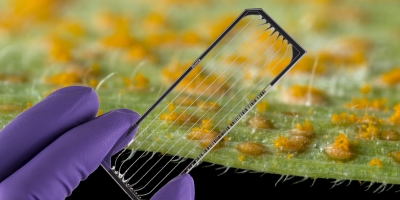Recognition

The ability of plants to perceive molecular signals from beneficial or disease-causing microbes and pests is critical in helping the plant to coordinate an appropriate response.
We will investigate the genetic and molecular basis of recognition. Discovery and understanding of microbial recognition mechanisms in plants will allow for the transfer of this knowledge for engineering enhanced recognition abilities in crops using synthetic biology approaches.
Plants’ perception of molecular signatures from beneficial or pathogenic microbes and pests is critical for the establishment of symbioses or initiation of immunity. Typically, these molecular signatures are sensed by receptors at either the cell surface (PRRs) or inside cells (NLRs). Diverse microbial or pest-derived molecules can be recognised, including complex oligosaccharides, nucleotides, peptides, and proteins. Some recognition events involve direct interactions between microbial or pest molecules and plant receptors.
However, indirect interactions also occur and receptors can detect changes in host molecular complexes, or the activity of a microbial molecule on host factors. To discover components involved in perception, we will investigate the genetic and molecular basis of recognition.
In addition, we will use synthetic biology approaches to develop new capabilities in nature’s toolkit. Discovery and understanding of microbial recognition mechanisms in plants allows engineering of these processes for agronomic benefit in crops.
- Objective 1.1 – Discovery of recognition events in plant-microbe interactions – (Professor Saskia Hogenhout, Professor Jonathan Jones, Professor Sophien Kamoun, Dr Matthew Moscou, Professor Cyril Zipfel, Professor Nick Talbot)
- Objective 1.2 – Understanding the mechanistic basis of plants’ recognition systems for detecting microbial signatures – Professor Mark Banfield, Professor Saskia Hogenhout, Professor Jonathan Jones, Professor Sophien Kamoun, Dr Matthew Moscou, Professor Cyril Zipfel, Professor Nick Talbot)
- Objective 1.3 – Engineering/deployment of bespoke recognition specificities in crops to improve disease resistance and symbiosis (Professor Mark Banfield, Professor Saskia Hogenhout, Professor Jonathan Jones, Professor Sophien Kamoun, Dr Matthew Moscou, Professor Cyril Zipfel)
